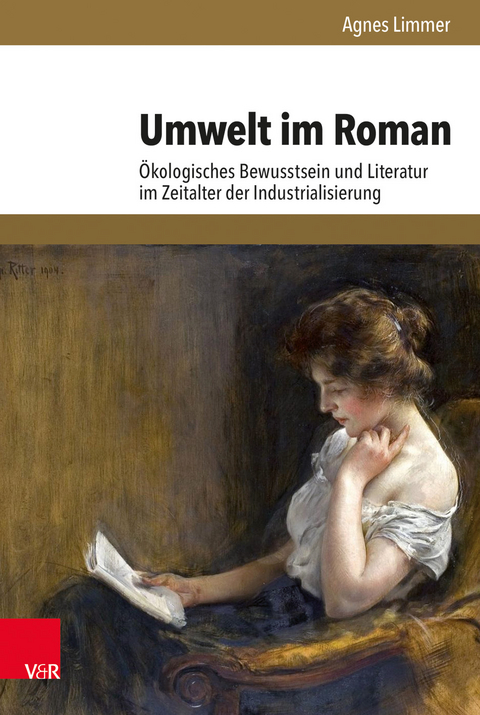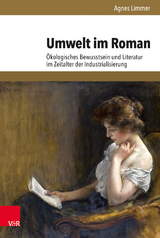Umwelt im Roman
Ökologisches Bewusstsein und Literatur im Zeitalter der Industrialisierung
Seiten
2018
Vandenhoeck & Ruprecht (Verlag)
978-3-525-35586-2 (ISBN)
Vandenhoeck & Ruprecht (Verlag)
978-3-525-35586-2 (ISBN)
Die Rolle des realistischen Romans für die Anfänge des modernen ökologischen Denkens und Handelns
The book provides insights into the social perception of environmental risks and their social impact during the first industrialization. It looks for the roots of our modern ecological consciousness in the cultural legacy of the long 19th century. It, therefore, employs prominent case studies from Europe and the United States, each grouping around a realist novel, a primary source of entertainment at the time. A reading of Charles Dickens, Wilhelm Raabe, and Upton Sinclair through an ecocritical lens reveals significant criticism of the shortcomings during their time. The intellectual protest manifests itself as an experimental, almost naturalistic and trendsetting writing style. At the same time, the individual writers propose solutions for the risk-laden environmental conditions with societal reconstruction at their center. Attentive contemporaries of the industrialization realized the necessity to address ecological and social problems jointly. Lacking political scope for environmental awareness, however, obstructed its social impact. This reinterpretation of several classics also draws on source material from personal correspondence or administrative files. The book makes a valuable contribution to the colorful and varied picture of the grand-parental generation of modern ecological thinking and action.
The book provides insights into the social perception of environmental risks and their social impact during the first industrialization. It looks for the roots of our modern ecological consciousness in the cultural legacy of the long 19th century. It, therefore, employs prominent case studies from Europe and the United States, each grouping around a realist novel, a primary source of entertainment at the time. A reading of Charles Dickens, Wilhelm Raabe, and Upton Sinclair through an ecocritical lens reveals significant criticism of the shortcomings during their time. The intellectual protest manifests itself as an experimental, almost naturalistic and trendsetting writing style. At the same time, the individual writers propose solutions for the risk-laden environmental conditions with societal reconstruction at their center. Attentive contemporaries of the industrialization realized the necessity to address ecological and social problems jointly. Lacking political scope for environmental awareness, however, obstructed its social impact. This reinterpretation of several classics also draws on source material from personal correspondence or administrative files. The book makes a valuable contribution to the colorful and varied picture of the grand-parental generation of modern ecological thinking and action.
Dr. Agnes Limmer-Kneitz ist Wissenschaftliche Referentin in der Projektgruppe „Landwirtschaft – Wasserwirtschaft – Klimawandel – neue Perspektiven für Landwirtschaft und Umwelt am Institute for Advanced Study an der Technische Universität München.
Prof. Dr. Christof Mauch ist Direktor des Rachel Carson Center for Environment and Society an der LMU München, sowie Ehrenprofessor am Zentrum für Ökologische Geschichte an der Renmin Universität in China und ehemaliger Präsident der Europäischen Gesellschaft für Umweltgeschichte.
Dr. Helmuth Trischler ist Forschungsdirektor des Deutschen Museums in München sowie Professor für Neue und Neuste Geschichte Ludwig-Maximilians Universität München.
| Erscheinungsdatum | 12.06.2018 |
|---|---|
| Reihe/Serie | Umwelt und Gesellschaft ; Band 019 |
| Mitarbeit |
Herausgeber (Serie): Christof U. Mauch, Helmuth Trischler |
| Überarbeitung | Ulrike Staudinger |
| Verlagsort | Göttingen |
| Sprache | deutsch |
| Maße | 237 x 160 mm |
| Gewicht | 448 g |
| Themenwelt | Sachbuch/Ratgeber ► Geschichte / Politik ► Allgemeines / Lexika |
| Geschichte ► Teilgebiete der Geschichte ► Kulturgeschichte | |
| Schlagworte | Geschichte/19. Jahrhundert • Literatur • Literatur und Ökologie • Literaturwissenschaft • Ökologie • Roman • Umweltgeschichte |
| ISBN-10 | 3-525-35586-6 / 3525355866 |
| ISBN-13 | 978-3-525-35586-2 / 9783525355862 |
| Zustand | Neuware |
| Haben Sie eine Frage zum Produkt? |
Mehr entdecken
aus dem Bereich
aus dem Bereich
der stille Abschied vom bäuerlichen Leben in Deutschland
Buch | Hardcover (2023)
C.H.Beck (Verlag)
23,00 €
Die Revolution des Gemeinen Mannes
Buch | Softcover (2024)
C.H.Beck (Verlag)
12,00 €




